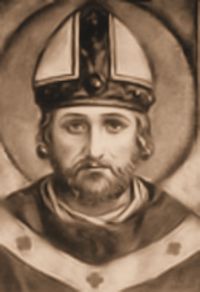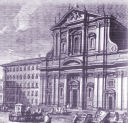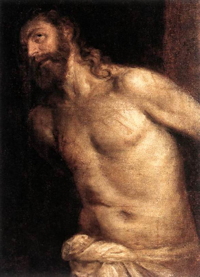Lent: March 16th
Monday of the Third Week of Lent
Other Commemorations: St. Heribert, Archbishop (RM); St. Jean Brebeuf, Priest and Martyr (RM)
» Enjoy our Liturgical Seasons series of e-books!
The Liturgy today is concerned with Baptism. Water by itself cannot cleanse leprosy; but God can use it to do so. If God can cleanse the leprosy of the body with water there is no reason why he cannot use it to wash off leprosy of soul. The second point which the Liturgy intends to bring home to us is that God's salvation is offered and available to all men who believe in his words and obey them. — St. Andrew Bible Missal
According to the 1962 Missal of Bl. John XXIII the Extraordinary Form of the Roman Rite, today is the feast of St. John de Brefeuf. His feast in the Ordinary Form of the Roman Rite is celebrated on October 19.
Meditation - On the Compassion of Some Women of Jerusalem
A goodly number of the women of Jerusalem (not disciples of Jesus) met this saddest of funeral processions. No doubt their weeping and sobbing and loud wailing, however sincere, was not in real accord with the sorrow that was straining Jesus' heart to the breaking point-His sorrow, namely, over their refusal to accept the truth of His Messiahship and of His supreme royalty as the promised Christ and Savior. Still, the heart of Jesus was deeply affected by the sympathy of these women. Contrasted with all else that was poured into His ears, it was very acceptable and was gratefully received.
But what lastingly gives this incident its chief significance is the fact that, even here in His greatest misery, Jesus is thinking predominantly of the doom of the Holy City and its temple, now practically sealed. Evidently His heart is aching at the vision of the horrors that will soon overtake it and the whole Jewish race, for its criminal blindness to His divine credentials and its obstinate refusal to profit by His teaching and His Precious Blood. For the days are near, when the barren among the Jewish women will be called blessed; when death, sudden and terrible though it be, will seem preferable to life. Try, therefore, to look deep into Jesus' Sacred Heart in its very keen sympathy for these women, and especially for their children. For of the children here present in the procession, or carried in the arms of their mothers, many no doubt were to be witnesses and victims of the abomination of desolation coming upon Jerusalem not forty years hence (Luke 19:41-44)
Excerpted from Our Way to the Father, Leo M. Krenz, S.J.
Things to Do:
- Read today's Gospel (the account of Lazarus and the rich man) with your children. Give them some inventive props, and have them act out this Gospel passage. Some children can play the part of the selfish rich man and his rich guests, and others may volunteer to be Lazarus and Abraham. Afterwards, ask them why they think Jesus chose to tell this story to the Pharisees and his disciples.

The Station is in the church of St. Mark, which was built in the fourth century in honor of the evangelist, by the holy Pope Mark, whose relics are kept there.
Saint Heribert
 Heribert was born in Worms and he was the son of Hugo, count of Worms. He was educated in the school of Worms Cathedral and at the Benedictine Gorze Abbey in Lorraine, France. He returned to Worms Cathedral to be provost and was ordained a priest in 994.
Heribert was born in Worms and he was the son of Hugo, count of Worms. He was educated in the school of Worms Cathedral and at the Benedictine Gorze Abbey in Lorraine, France. He returned to Worms Cathedral to be provost and was ordained a priest in 994.
In the same year, Otto III appointed him chancellor for Italy and four years later also for Germany, a position which he held until Otto's death on 23 January 1002. Heribert was made an archbishop of Cologne on 998. Then, he also served Emperor St. Henry.
Heribert built the monastery of Deutz, on the Rhine and performed miracles, including ending a drought. He is thus invoked for rains.
He died in Cologne on March 16, 1021 and was buried at Deutz.
He was already honored as a saint during his lifetime and was canonized by Pope St. Gregory VII about 1074.
—©Evangelizo.org
Patronage: against drought; for rain; Deutz, Germany
Symbols and Representation: archbishop calling down rain by his prayers; man kneeling before Saint Henry II; episcopal attire
Highlights and Things to Do:
- Read more about St. Heribert:
- Watch this short video from gloria.tv on St. Heribert of Cologne.
- His relics were relocated from Old St. Heribert to the Neu-St.Heribert church in Köln-Deutz.

Saturday of the Fourth Week of Lent
Station with San Nicola in Carcere (St. Nicholas in Prison):
Today's Station is at St. Nicholas of Barin in Prison, dedicated to the popular St. Nicholas of Myra or also referred to as St. Nicholas of Bari, whose feast is December 6. It was constructed in the ruins of two temples and the ancient Forum Olitorium, with visible fragments from the ruins reused in the church. The most important of the temples was the Temple of Piety, built by Acilius Glabrius, consul in 191 B.C. The dedication to St. Nicholas was made by the Greek population in the area.
For more on San Nicola in Carcere, see:
For further information on the Station Churches, see The Stational Church.






